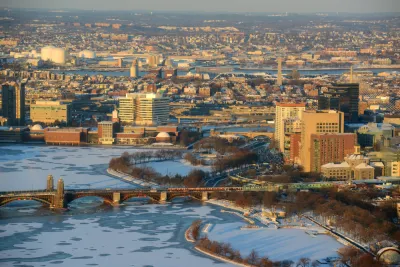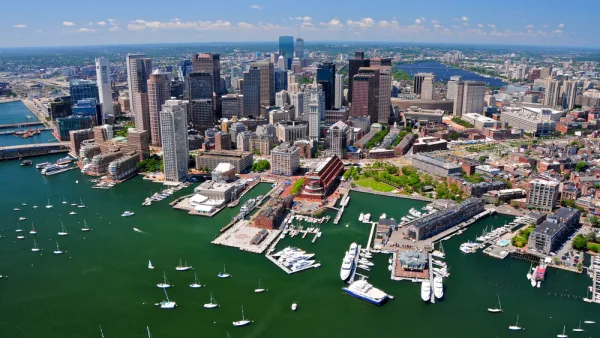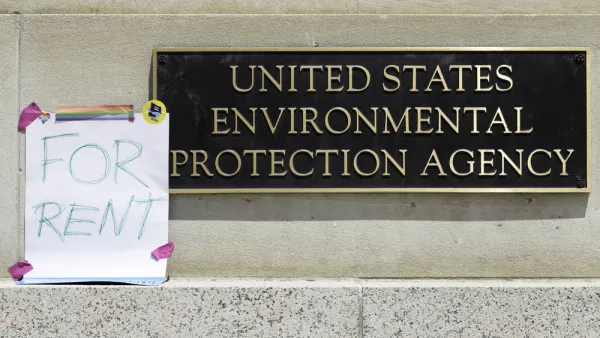The Boston Foundation published the “Inaugural Boston Climate Progress Report” earlier this month. Other U.S. cities should follow their lead.

Boston is one of the first U.S. cities to assess its progress toward achieving net zero emissions by 2050, with the publication of the “Inaugural Boston Climate Progress Report” by the Boston Foundation earlier this month. The 2050 net zero goal is in line with the recommendations of the United Nations International Panel on Climate Change published earlier this year.
The report, co-authored by Planetizen blogger Joan Fitzgerald along with Michael J. Walsh, answers the question: “How well is Boston—as a civic community—driving forward system transformations to meet climate, resilience, and equity goals?” To do so, the report “highlights a dozen key outcomes that must be achieved by programs, projects, and initiatives whose success is imperative to reaching the overarching goals, and lays out four ‘big lifts,’ system-transforming actions which Boston—along with the broader region and state—needs to accelerate to sharply reduce net emissions,” according to the Boston Foundation’s website for the report.
“Progress snapshots” for each of the key outcomes and can be explored at the links below:
Key Outcomes
- Low Carbon Electricity
- Electrified Mobility
- Equitable Housing and Mobility
- Electric and Efficient Buildings
- Greater Integration of Energy Systems
- Targeted and Modest Use of Fossil and Alternative Fuels
- Sustainable Waste Management
- Responsible Carbon Dioxide Removal
- Robust and Resilient Urban Forests
- Protection of the Coastline
- Preparation for Extreme Weather
- Repair of Past Harms
The report describes the four big lifts as “multidecade, multi-platform projects that would play critical roles in helping the city align with its climate and equity goals.”
Big Lifts
- Big Lift #1: Retrofitting Small Building Stock
- Big Lift #2: Local Energy Planning for an Electrified City
- Big Lift #3: Building a Resilient Coastline Through Improved Governance
- Big Lift #4: Prioritize Reparative Planning for Boston’s Frontline Neighborhoods
For its part, Boston will face unique challenges while making progress toward the net zero goal. The city reduced greenhouse gas emissions by 21 percent between 2005 and 2019, according to the report, but the Brookings Institution ranked Boston as the most unequal U.S. city in 2014.
Even with a long way to go to turn this wish list into a series of accomplishments, Boston is poised for a leadership role in the climate crisis. When organized into this kind of conceptual framework, the challenge of reducing emissions and preparing for the disruptions to come seems doable, even if still immensely challenging.
FULL STORY: Inaugural Boston Climate Progress Report

Analysis: Cybertruck Fatality Rate Far Exceeds That of Ford Pinto
The Tesla Cybertruck was recalled seven times last year.

National Parks Layoffs Will Cause Communities to Lose Billions
Thousands of essential park workers were laid off this week, just before the busy spring break season.

Retro-silient?: America’s First “Eco-burb,” The Woodlands Turns 50
A master-planned community north of Houston offers lessons on green infrastructure and resilient design, but falls short of its founder’s lofty affordability and walkability goals.

Test News Post 1
This is a summary

Analysis: Cybertruck Fatality Rate Far Exceeds That of Ford Pinto
The Tesla Cybertruck was recalled seven times last year.

Test News Headline 46
Test for the image on the front page.
Urban Design for Planners 1: Software Tools
This six-course series explores essential urban design concepts using open source software and equips planners with the tools they need to participate fully in the urban design process.
Planning for Universal Design
Learn the tools for implementing Universal Design in planning regulations.
EMC Planning Group, Inc.
Planetizen
Planetizen
Mpact (formerly Rail~Volution)
Great Falls Development Authority, Inc.
HUDs Office of Policy Development and Research
NYU Wagner Graduate School of Public Service




























